Top Five!
Fiction and nonfiction + 2021 reading plans
Happy Friday! At last, the stirring conclusion to my year in reading. (Here are parts one, two and three if you missed them.) It has been so refreshing to correspond about something other than pandemic conditions and constraints - thank you for writing and commenting. I’d love to hear your recommendations, reader friends, comment on the post (you can do it anonymously) or drop me a line.
1) History of Violence by Édouard Louis, trans. Lorin Stein (Vintage, 2019)
I was surprised this book ended up in my top spot, but when thinking through everything I read last year, I realized it was the most astounding and indelible experience. I’m surprised because I’ve been cowardly about reading books on difficult subjects in recent years, given all of the distress available everywhere else, non-stop. I probably wouldn’t have picked it up if it hadn’t been confidently recommended by friends with trusted opinions on fiction. (I often read cookbooks at bedtime because they’re full of ideas and devoid of human drama. Cookbook readers, it would be so fun to correspond, too, but that’s like a whole other project. But for the record this was my year of Marcella Hazan and Madhur Jaffrey.)
In this short novel, Louis chronicles his experience of being raped and nearly murdered by a casual hook-up he brings home on Christmas Eve. He does this in the clearest, smartest prose, and with a masterful use of fiction as a medium. It really made me appreciate the novel as a form again. It’s not just the story of surviving a violent act, it examines how such an event can possibly be told, how many ways it’s told, and how each one is incomplete: institutionally (at a hospital, pharmacy, police station), by his judgmental family, by his caring friends, and by himself. Louis manages to strip away the stigma of surviving violence by laying it out in the open, seeking the deepest sort of honesty, including recollections of the tender moments with his assailant. It’s this uncompromising exposure and his grasp of the buried history (in terms of class, family) and resonance of individual acts that make it compelling and sort of dazzling, like a lightning storm, rather than devastating.
In terms of form, I think this was also a real vindication of autofiction. The author doesn’t have to bother with “thinly veiling” anything behind made-up characters and names, but is also free to use the tools of fiction (imagining the voice of his sister, for example), without having to parse what’s “true” or untrue. (This is leaving aside the ethics about writing about people you know, of course, which can also blow up your life, as Karl Ove Knausgaard found out. Has anyone written about this?) I haven’t even mentioned Louis’ age - he was 24 when this was published and 22 when he published his first acclaimed book. I’m generally skeptical of literary wunderkind, but in this case I’m just happy he hopefully has many books still to come.
Provenance: The American Book Center in The Hague, recommended by my friends, luminous poet Laura Cronk and Dave Wilson of Jersey City’s best indie rock band Miss Ohio.
2) What It Is by Lynda Barry (Drawn & Quarterly, 2008)
This book is many things at once: a series of collages that blend both word and image, a memoir in comics form, a treatise on aesthetics, a workbook to generate creative writing. Lynda Barry delves into profound questions like what is art and why do we need it with playfulness, heart, humor, and attentiveness to different types of intelligence. It’s a model for the kind of book I want to see more of in the world - philosophical and fun, intellectually honest and unconcerned with genre. It’s also visually gorgeous. The collages incorporate handwritten letters from the 1950s. Handwriting is so evocative and intimate (which Barry is keenly aware of - she calls for writing only by hand).
(Barry teaches at the University of Wisconsin, and I have a fantasy of moving to Madison for 6 months to take her class on creativity. She lavishes her students with this strict and generous sort of teacher-love, where their work becomes so precious to her, evident in the other book of hers I love, Syllabus. It must be a truly life-changing experience.)
Provenance: The American Book Center in The Hague.
3) The Lying Life of Adults by Elena Ferrante (Europa Editions, 2020)
I often read a bunch of reviews after I finish a book, and sometimes poke around in Goodreads to see what others thought about it. (Book Marks is a great site that collects all reviews in one spot.) Not only does it make me realize aspects I might have missed, completely disagreeing with someone can also crystallize my own thoughts about a book. This happened after I read the surprisingly negative review in The New Yorker of Ferrante’s new novel. The reviewer calls it puerile and is dismissive of the teenage narrator’s point of view, calling her overwrought. I thought this was what was actually so brilliant about this book - how it takes the experience of adolescence so seriously. It’s also important to note that it’s an adult narrator looking back at her teenage self. (Phone me up next time, New Yorker.)
Ferrante captures the period when the world of childhood illusions crumbles away, and all of the hard truths start hitting. For her narrator, it’s the fallibility of her parents, the limitations of her middle-class upbringing, the influence of a woman’s physical appearance on the course of her entire life, the double-bind of power and vulnerability that comes with a young woman’s sexuality. The portrait of her father’s sister, her vulgar, dramatic, ugly-beautiful aunt who lives in the working class part of Naples, is unforgettable. The New Yorker review also criticized the fact that, although it’s set in the 1990s, the Italy of that time isn’t visible. Again, I think the review writer’s own age and prejudices limited her view of the book. It was fascinating to see Ferrante take on a Gen-X narrator, what she took for granted, what new powers she had compared to the women in the Neapolitan Quartet. If I have any quibble, it’s with the ending, which felt very rushed, but I can only hope that it’s because there’s a sequel to follow… By the way, it was so exciting to read a book by a favorite living author hot off the press. How many times in one’s life does that happen? What a luxury.
Provenance: The American Book Center in The Hague.
4) Corazón tan blanco by Javier Marías (1992)
[A Heart So White]
I could try to pontificate about the greater themes of this novel, but for me at heart it was just an intriguing, elegantly written story, one that spun out the central mystery of a family history into every sentence. This was the first Marias book I’ve read and would definitely pick up another. I’ve owned this book for years, and abandoned it on a previous try. It took me 50 pages or so to really get hooked in. He’s a conscious stylist, with recursive, almost incantatory phrases, and quiet humor. As far as greater themes, I’d start with: marriage (what should or should not remain unspoken?), generational trauma, choosing passivity or action (there’s probably better phrasing for that one).
Provenance: A bookstore in NYC, I suspect the big Barnes & Noble on Union Square, which had an ever-growing Spanish fiction section. Thank you to my friend Literature Supporter (who leads Twitter reading groups) for the Marias recommendation over many years!
5) Reality Hunger: A Manifesto by David Shields (2010)
I think this book upsets a lot of people, but if your manifesto isn’t pissing someone off, you’re probably doing it wrong. This is Shields’ call for literature to leave behind traditional devices like plot, character, and genre in favor of collage, fragmentation, blurring of fiction and nonfiction, in order to better represent our experience and time. He uses the book itself as an example - it’s made up of hundreds of quotes and samples of other texts (from pop culture to philosophy), mixed with his own writing, all stripped of context and presented in numbered paragraphs. Who can resist numbered paragraphs? I can’t. I don’t know why… So the book itself is a collage and impossible to categorize.
It’s probably clear from my reading list that I don’t take sides in this battle. I don’t believe the novel is dead, but I do want a novel to push beyond a tidy story with carefully constructed characters. And I love experimental forms like lyric essays, but that’s not to say those can’t be insufferable, too. I feel I should say that post-modern theory isn’t part of the context for me here, either. My university English department was old-fashioned. I was reading Norton anthologies and when anyone brings up Lacan or Barthes or whatever other 70s French thinker I feel instantly thick. So my preferences are intuitive… This was another one I had been carrying around for a while. It was fresher when I bought it, but I’d say it holds up 10 years post publication. I loved the boldness, it’s jam-packed with ideas while being so readable, though definitely not one you’d want to read in one sitting.
Provenance: Spoonbill & Sugartown bookstore in Brooklyn.
So what to read next?
I have various mental piles of books to read this year, in the following categories:
Gifts from friends I’ve been carrying around for years
I feel guilty about not reading these books as they were given to me with love ages ago. On the other hand, my dedication to moving them from apartment to apartment to apartment does say something about my loyalty to my friends and trust in their taste. It just hasn’t been quite their time yet! Given that my favorite books last year were recommended by friends, I think the time is now. The books:
House of Leaves by Mark Z. Danielewski, a long-ago birthday gift from my dear friend Shannon. I think I’ve been intimidated by its heft, but it has a lot of white space and I think it’s actually spooky-fun read.
Austerlitz by W.G. Sebald, a gift from my friend Franco, a physicist with great taste in books. I’ve started it a couple of times, but it didn’t take. I do know this has been called one of the greatest books of the 20th century…
The Passion According to G.H. by Clarice Lispector, a loan from my friend Penny when we were in grad school. Many babies born that year are now driving (and I feel terrible I still have this, but I swear by this newsletter that I will get it back to her!). I’m happy I have most of Lispector ahead of me. She sounds amazing.
For the two-person Spanish book club my sister and I formed
Señales que precederán el fin del mundo by Yuri Herrera, a newish book by a young Mexican writer. (It has been translated into English and received high praise, Signs Preceding the End of the World.)
Other stand-outs in the once massive floor pile, now entire bookcase of books I own and haven’t read
The Country Life by Rachel Cusk. One of her early, more conventional novels. Bought this in the throes of my obsession last year, but I couldn’t get into it.
The Wild Laughter by Caoilinn Hughes. Second novel by the Irish writer. This came out last year and got lots of good press. (Caoilinn lives in The Hague and I’ve had the good fortune to meet her.)
Other
19th-century literature: I think I need to mix it up for a change in vocabulary. I’m thinking some Austen or Dickens. I own Pride and Prejudice and Hard Times, so likely one of those. (Austen is a big gap in my reading.)
Comics/graphic novels: No concrete plans yet, open to suggestions.
Essay collections: Vivian Gornick is on my list, haven’t read her, and she’s part of that incredible generation of women writing in the 60s and 70s I’ve been discovering the past few years (includes Joan Didion, Mary McCarthy, Renata Adler, Elizabeth Hardwick, Susan Sontag, Eve Babitz). Hilton Als’ White Girls and Kiese Laymon’s Heavy are also on the list (thank you, Mark V. for the recommendations!).
Suggestions
I would love to hear your recommendations of life-changing books, especially essay collections!
***
Now 2021 can begin in earnest. Thanks for reading along! It’s been fun and a good motivator to put together these notes on my reading life. I won’t be writing weekly, but will likely send another book-related dispatch soon.






Ok first of all Move to madison for six months!!! It’s where I moved two years ago and I love it! (Ok maybe try to take the class in the fall semester and come before in the summer - winter can be a bit brutal 😅). Second, corazón tan blanco is also one of my faves! Third, you should totally read House of Leaves. It is really fun and honestly one of the very few books that I found actually scary !! Fourth, I hadn’t heard of the David shields and am immediately adding it to my list !!
As for collections of essays (I am using this term loosely here) that have changed my life, you probably have read some of these but: 1) Slouching towards Bethlehem, by Joan Didion 2) 300 arguments, by Sarah Manguso, 3) Seven pleasures, by Willard Spiegelman, 5) Bluets, by Maggie Nelson 6) The four loves, by C. S. Lewis 7) 23 things they don’t tell you about capitalism, by Ha-joon Chang, 8) The self unstable, by Eliza Gabbert, 9) Traité de savoir-vivre à l’usage des jeunes générations, by Raoul Vaneigem, 10) La pesanteur et la grâce, by Simone Weil (which is my “livre de chevet” of all time). Honorable mentions to Voyage sur Un fantôme: Rome, le scooter et ma mère by Jérôme Orsoni, Citizen by Claudia Rankine, Nothing good can come of this, by my friend Kristi Coulter, Female Chauvinist Pigs, by Ariel Levy, L’excès-usine by Leslie Kaplan, 24/7 by Jonathan Crary.